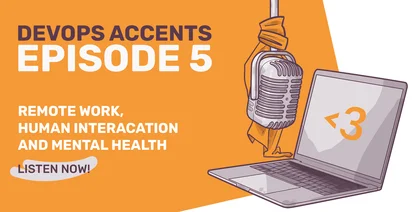Remote Work, Human Interacation and Mental Health, Work Framework and Legal Issues |🎙️#5

In this episode of DevOps Accents, Leo, Pablo and Kirill are talking about remote work.
- How the landscape of remote work has changed in recent years?
- How not to slack off work when working from home?
- Office work and the importance of human connection;
- TAXES;
- Work and mental health.
You can listen to episode 5 of DevOps Accents on Spotify, or right now:
In recent times, the workplace has undergone a transformation unlike any before, propelled by advances in technology and a significant shift towards remote work. This change has sparked a broad spectrum of discussions, from the impact on productivity and mental health to the evolution of work culture and the technology that facilitates it. Here's what we've learned from exploring these crucial topics.
Embracing Remote Work: A Double-Edged Sword
Remote work, once a rarity, has become a staple in our professional lives. The flexibility to design one's schedule and the elimination of commuting are among its most lauded benefits. However, this new freedom comes with its challenges. For many, the lack of a structured office environment has blurred the lines between work and personal life, leading to extended work hours and, in some cases, a sense of isolation. This shift necessitates a balance, encouraging productivity while ensuring mental health is not compromised.
Technology: The Backbone of Modern Workplaces
The role of technology in facilitating remote work cannot be overstated. From communication tools to project management software, technology has bridged the gap created by physical distance. Yet, the reliance on these tools has also raised concerns about surveillance and privacy, with companies implementing software to monitor employee activity. This tension underscores the need for trust and transparency between employers and employees.
The Impact on Work Culture and Mental Health
The transition to remote work has significantly impacted work culture and mental health. The absence of a physical office has diluted the sense of community and camaraderie that comes from face-to-face interactions. Moreover, the isolation of working from home can affect one's mental well-being. Companies are now faced with the challenge of fostering a supportive work culture remotely, emphasizing the importance of regular check-ins and creating opportunities for virtual socialization.
Looking Ahead: The Future of Work
As we navigate this new landscape, the future of work remains an open question. Will remote work become the standard, or will there be a return to traditional office environments? The answer likely lies in a hybrid model, combining the best of both worlds. However, achieving this balance requires addressing the challenges head-on, from ensuring equitable access to technology to reimagining what work culture looks like in a digital age.
Conclusion
The shift towards remote work, driven by technological advancements, presents both opportunities and challenges. As we look to the future, it's clear that flexibility, innovation, and a commitment to supporting the well-being of employees will be key to navigating this new norm successfully. The journey is just beginning, and it's up to us to shape the future of work in a way that is inclusive, productive, and sustainable.
Podcast editing: Mila Jones, milajonesproduction@gmail.com
